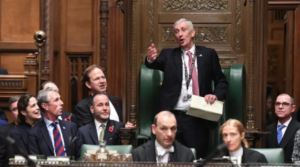Journalists protesting in Kashmir on Tuesday, Nov 12, 2019. Photo courtesy of Shutterstock (via The New York Times).
“The judiciary has played a great role in the past in ensuring that freedom of speech is protected,” Siddharth Varadarajan, Founding Editor of the Wire, one of the foremost mainstream non-profit publications in India, told students and guests at NYU Wednesday, February 12. “And what’s happened over the last five or six years, but particularly over the last two or three years, is that the judiciary is not playing that kind of a role anymore.”
Varadarajan, over a 90-minute discussion, laid bare the alarming state of free speech politics in India, touching on Jammu and Kashmir (J&K), the Rashtriya Swayamsevak Sangh (RSS), Prime Minister Narendra Modi and the news media.
India might not be a “banana republic,” as Varadarajan put it, but the current situation doesn’t inspire much confidence. The handling of the J&K situation, for one, with information blockades and the mobilization of thousands of troops, has been highly controversial. The approach to the problem of heightened tensions in the region seems highly flawed, due in part to the over-militarized response – which has been raising flags of Modi’s autocratic leanings, but that is to be expected, given Modi’s less than a stellar track record of implementation – recall the demonetization scheme. The government’s actions, based on the dubious argument of risks to “national security” from Pakistan-backed Taliban forces, is not helped by the cold hard numbers which show that the devastation caused by militant and terrorist violence over the last year has decreased to less than a tenth of the devastation caused a decade ago.
“It’s now been six months that the people of Kashmir valley have been without broadband internet,” Varadarajan shared with the audience at the Arthur L. Carter Journalism Institute. Internet access was restored three weeks ago, but at speeds of 2G, rendering all but the most basic information inaccessible, including email. Not that the speed was much of a limiting factor – information access was restricted through “North-Korea style whitelisted sites,” a rather blatant attack on the freedom of the press.
Several politicians, such as Mehboob Mufti and Omar Abdullah, were placed under arrest alongside thousands of people during the internet ban and were held without charge. On top of that, “those leaders that are being released are being made to sign a bond where they commit to not commenting on the situation in Kashmir for up to a year,” Varadarajan revealed. “It is not constitutional. It is not legal.”
And for all the unsubtle movements to restrict the power of the press, the media can still be considered a “privileged oasis” in comparison. “The pressures on free speech and free expression are felt on other sectors, by universities, by people from marginalized communities,” Varadarajan told the audience. “It’s much harder to protest today in states like Uttar Pradesh. In Jammu and Kashmir, it’s virtually impossible.”
The right to assemble peacefully in Uttar Pradesh falls under the jurisdiction of Section 144, a law that allows the authorities to impose restrictions on the gathering of more than four people in any one place and which has only recently been pulled out of obscurity into public attention. That law is now being invoked to curb protests that are “anti-government.”
Prime Minister Narendra Modi, whose policies into his second term – most notably the Citizen Amendment Act of 2019 – have taken a leaning towards the ideologies of the RSS and who has previously referred to Muslim migrants as “termites,” has not had a single press interview over the course of his five and a half years in office. In addition, his unofficial support of “Hindutva” – the belief of the RSS, a far-right “fascist” organization founded in 1925, that Hindus are the authentic Indians, unlike Muslims, Jews and others whose holy places lie outside India – has made him a highly controversial figure, made more so by the utter lack of a genuine media interaction. “This is a guy who doesn’t believe in unscripted media interactions,” Varadarajan said, incredulous.



